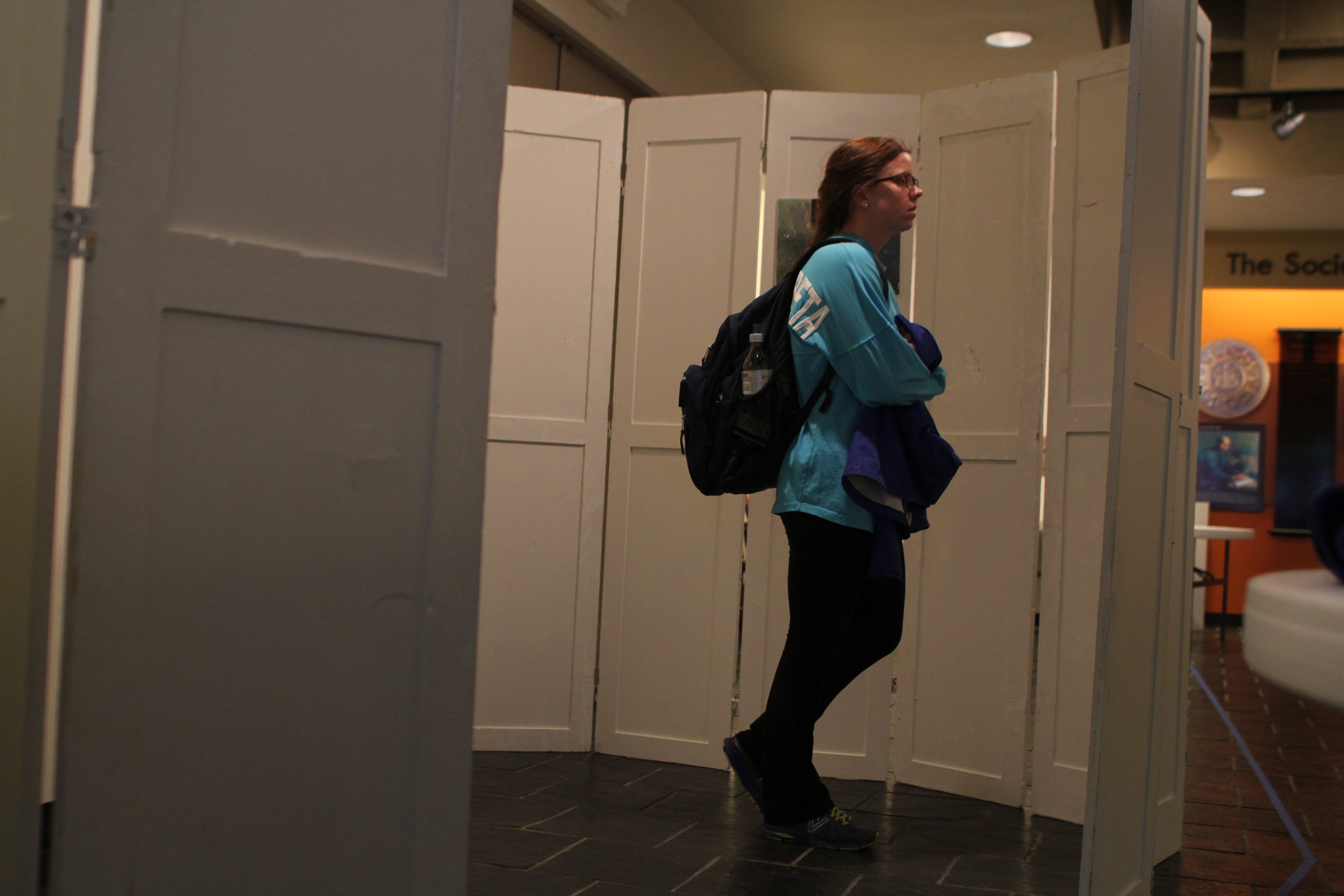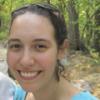
A Rockhurst University student reads over facts regarding refugees inside the space where a family of five would typically have to live. The exhibit was part of the Jesuit Refugee Service/USA’s Refugee Camp-Out and Social Justice Week, held at the Kansas City, Mo., school April 9-10. (NCR photo/Eloísa Pérez-Lozano)
The international Jesuit program that aids refugees in some of the world's most troubled spots is helping Catholic students understand refugee life by hosting mock refugee camp experiences on school campuses.
Part educational, part fundraiser and part interactive experience, the Jesuit Refugee Service/USA's Refugee Camp-Out allows participants to show solidarity with nearly 43 million displaced persons worldwide, according to the organization.
Jesuit Refugee Service's mission is to accompany, serve and defend the rights of refugees and other forcibly displaced persons. The organization, which has its international office in Rome, has a staff of more than 1,400 people worldwide, many of them volunteers, working in places such as Colombia, Somalia and the Dominican Republic. The regional Jesuit Refugee Service/USA is based in Washington, D.C.
The Refugee Camp-Out event invites students to spend time in a public space on campus to remind their community of the global refugee crisis.
Participants walk through three stations: food, water and shelter. Each station puts on display the kinds of conditions refugees regularly have to live in and provides many facts and figures regarding different aspects of refugee life. Each station also features photos of refugees from different countries.
Students at Jesuit-run Rockhurst University in Kansas City, Mo., got a taste of refugee life April 9-10 during the university's Social Justice Week, which is organized by the student group VOICES for Justice and the school's fraternities and sororities.
As students walked through the simulation, they experienced some of the harsh realities of camp life, from carrying heavy buckets of water, to the limited space inside a family tent.
The mock camp was held at the Finucane Center on campus and it ran both days from 11 a.m. to 5 p.m. Students could participate for free.
Students first faced the reality of the living space of a refugee. Jesuit Refugee Service/USA outreach coordinator Laura Gaspo said that while 3.5 square meters per person is the minimum recommendation of the United Nations Refugee Agency, refugees typically get half of that. To illustrate this, Jesuit Refugee Service/USA set up portable partitions that halved the supposedly allotted space for five people.
Gaspo then asked the students to try to imagine how five people could live in such a space, sleeping, cooking and sharing a common area. "Hopefully, once [the students are] trying to figure all that out within that small space, they can really see how limiting it is," Gaspo said.
At the water station, she explained to the students that refugees are given a minimum of one gallon of water per person per day for personal use that includes drinking and bathing. This is then put into stark contrast alongside five gallons of water, which equals five minutes of an average American shower.
Participants were then invited to walk a short distance carrying a bucket with two 20-pound weights in it to simulate the weight of the water that refugees might have to carry for a few miles.
According to Gaspo, they tried to use "visually striking images" at the food station to compare a typical Rockhurst student diet with what a typical refugee will eat. One table showed the student's typical breakfast, lunch, snacks and dinner and another showed the refugee's version: three bowls of white rice with black beans.
"It's the same food over and over and over again, it's very repetitive and not very nutritious," she said.
After the simulation, students learned about what Jesuit Refugee Service/USA does with each refugee population and they were given practical tools to become more actively engaged in the issue.
"We hope by demonstrating the realities of life in a refugee camp, students will be inspired to become activists," Gaspo said. "It's important to remind students how powerful and influential their voices and actions are in defending and advocating for refugees who are often forgotten and silenced."
Mary Schletzbaum, a senior graduating this spring, participated in the simulation to learn more about refugee life and stayed afterward to speak with Gaspo.
"I gave a presentation on refugees in a class and I love social justice," she said. She plans to serve as a Jesuit volunteer based in Tanzania starting in late November.
According to Gaspo, this is the second time the organization has partnered with a school to host the event, the first time taking place last year at Jesuit College Preparatory School of Dallas. The Dallas event was an overnight camp-out that included panels and speakers. The Rockhurst version was a walk-through simulation that lasted about 15 minutes in order to accommodate the busy schedules of college students.
Jesuit Refugee Service/USA's goal is to replicate the experience in high schools and universities across the country, Gaspo said.
[Eloísa Pérez-Lozano is an NCR Bertelsen intern. Her email address is eloisapl@ncronline.org.]


